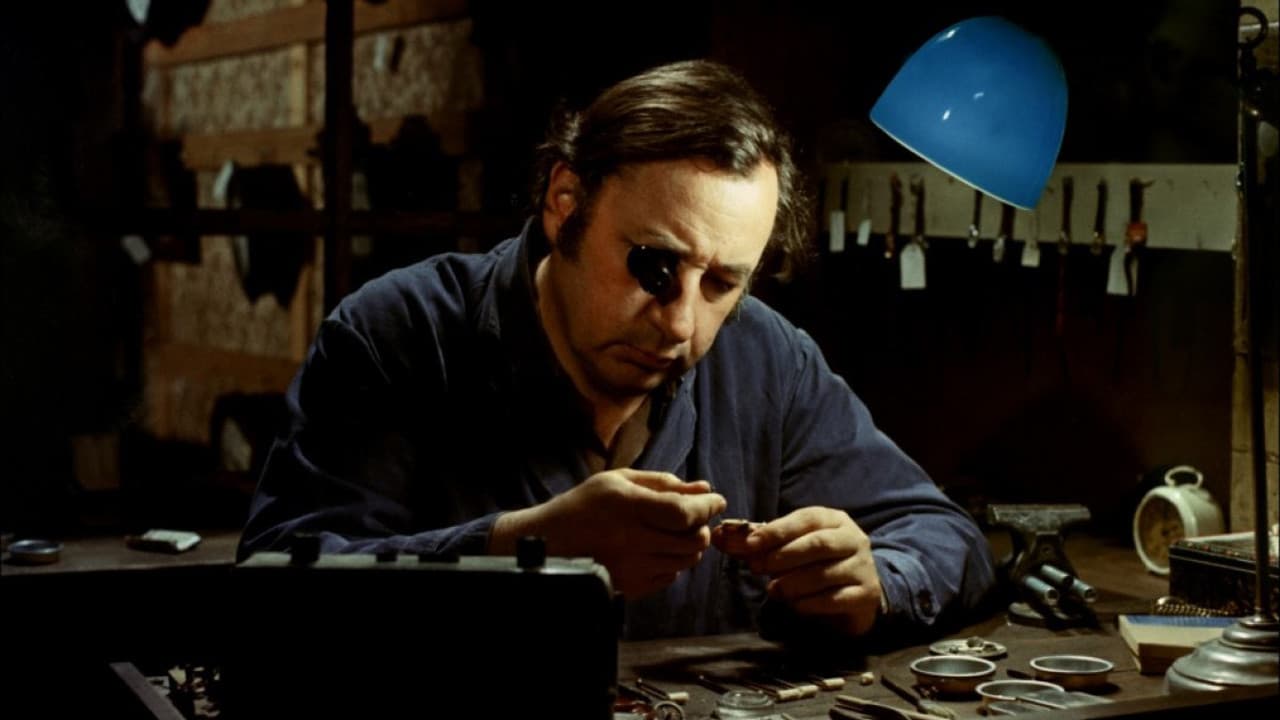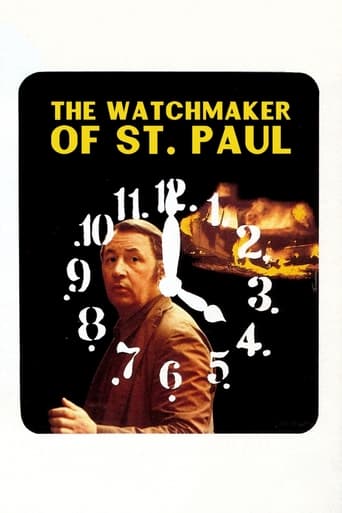



I like the storyline of this show,it attract me so much
View MorePerfectly adorable
Good concept, poorly executed.
It’s fine. It's literally the definition of a fine movie. You’ve seen it before, you know every beat and outcome before the characters even do. Only question is how much escapism you’re looking for.
View Moreit is the basic point defining this special drama. the root - admirable performance of Philippe Noiret. and the case of a deep solitude. defining the fall in near reality. a film for reflect. about parenthood and about the pain as refuge. about the shock changing everything. about the truth. and the post words. and, sure, about the peace with yourself. as the only reasonable answer to old fears and certitudes.
View MoreThe lonely, simple life of Michel Descombes (Philippe Noiret), a clockmaker who lost his wife years ago, changes when hears that his grown-up son murdered a man and is on the run with his girlfriend. Michel is shocked and questions his upbringing, while a nice police inspector (Jean Rochefort) shows much sympathy for him.Tavernier's shining debut and co-operation with New Wave veterans Aurenche and Bost brings a novel by Simenon on screen. It's a work of old-fashioned concision that the mechanic of the title would have been more than proud of. It is more a psychological study than a crime drama, because there is next to no outer plot. The happenings are taking place in the head of Michel, the father, masterly played by Philippe Noiret, who suddenly gets confronted with the serious actions of his son. He becomes aware of how little he knows about him, although they used to be together all the time. The focus is less on the murderer nor on the victim, but more on what the catastrophe means for the father of the committer, in a powerful work of authenticity.
View MoreI did not love this movie, but it was better than average--particularly because of its originality. However, to an American audience, it may be difficult to relate to the French justice system circa 1974. At first, the star of the movie, Philippe Noiret, is a rather apolitical man who seems quite ordinary. When the police inform them that his son has murdered someone, he initially does pretty much what the police ask. When the investigating officer tries to get close to Philippe (sort of "buddy buddy"-like), he allows him. However, through the course of the film, Philippe begins to see the police as the enemy and he rebuffs these attempts by the police to be friendly. The problem for me is WHO is right? Were the police at this point of time quick to violate human rights or manipulate the families of the accused? I really didn't know if Philippe was having his eyes opened to the truth or if he just learned to identify with and excuse evil. This would NOT pose a problem to a French audience but for those not familiar with the French legal system it seemed confusing--was Philippe a good man or a good man going bad? As far as the acting and pacing is concerned, this is a good flick.
View More"The Clockmaker" is a minor classic... so great, in fact, that nobody seems to know what to do with it. Why? Perhaps it doesn't fit neatly enough into the crime genre. The first shots are provocative: A child looks out from a train at a burning car. As the opening titles hit the screen, the music crescendoes. We know something bad has just happened; we brace ourselves for the violence to come. The cinematography here has the hard-hitting feel of exposé cinema (e.g., Costa-Gavras' `Z'.) As if leaving its promise unfulfilled, however, this is the film's most dramatic moment. The only violence, as it were, has occurred before the action director Bertrand Tavernier shows us. Much like its principal characters, we are left to contemplate what happened and WHY it took place.The story is simple enough. Monsieur Decombes, a clockmaker, is interrupted at work by the local police. They inform him that his abandoned car was found by the side of the road, left there by Bernard, his son. Would he accompany them to go see it? Under this pretext, they bring him to the station, where he meets a mysteriously evasive Inspector Guilboud. They return to the vehicle together. Only then does the inspector confront him with the awful truth: Bernard and his girlfriend have killed a man. Decombes is shocked. How could his boy have done it? Throughout the rest of the film, he struggles to understand this hideous crime and his relationship with Bernard, ultimately left with more questions than answers.Mainstream moviegoers find "The Clockmaker" boring and anticlimactic. They're used to seeing crime flicks with action and plot twists. Here, they know the identity of the murderer from the start, they never see a dead body or an exciting arrest, and 90% of the focus is on the criminal's father. What they're left with is an hour and a half of wayward wanderings... of "character development." What could be more pedestrian? One almost gets the sense that this was the very reason that Tavernier chose to bring Georges Simenon's book to the screen: It's structure is a full inversion of what audiences are used to. This is a point that deserves to be revisited later, as it has a great deal to do with the deeper meanings of this work.While it won the Prix Louis Delluc, `The Clockmaker' has never been taken seriously by arthouse snobs either. They call its direction `heavy-handed.' They note the over-the-top performances of Philippe Noiret and Jacques Denis (not to mention Yves Afonso. runner-up to Alain Delon in the "too-cool-for-words" competition.) Oddly, they call it `commercial'... a conventional social melodrama. And while it isn't Hollywood melodrama of the Douglas Sirk or Nicholas Ray varieties, there is some validity in this assertion. The definition of `melodrama' describes the film well: `A composition. intended to exhibit a picture of human life, or to depict a series of grave or humorous actions of more than ordinary interest, tending toward some striking result.' And the point of the film is all-too-obvious: Love isn't clockwork.I've heard `The Clockmaker' compared to many films, including those of the French New Wave that preceded it. Is there any similarity, though, between Tavernier's work and such melodramas as. say. Godard's `Vivre sa vie' or Truffaut's `The Soft Skin'? There isn't. Some have suggested that the film was the model for `The Sweet Hereafter', in that both deal with isolation and the loss of children. Yet, where Egoyan's film is politically neutral to the point of nihilism, `The Clockmaker' outlines a specific set of social conditions that made murder an inevitability. The factory watchman is the avatar for all social-climbing capitalists. abusing his authority toward lecherous ends. Liliane, Bernard's girlfriend, is the powerless victim. Whether or not Bernard pulled the trigger is immaterial. In effect, society has handed him the gun, cocked and loaded.Personally, I find the film more similar to the work of the New German Cinema. particularly Fassbinder's `Mother Küsters Goes to Heaven.' Both films begin just after murders have been committed. Both films spotlight those who are left behind to deal with loved ones' unspeakable acts. Both films give us radicals and reactionaries, each determined to use the protagonists' woes to political advantage. Ultimately, `The Clockmaker' is the more profound work of the two. It is a true `slice of life' and not the stagy drama that `Mütter Küsters' is. Starting from a conservative stance in its opening scene, in which Decombes and his friends discuss the merits of capital punishment, it turns out to be a liberal piece. Its point, as I see it, is not merely that 'violence begets violence.' True love, in Tavernier's paradigm, comes not from hearing but from listening. not from validation but from understanding. not from making things run like clockwork but from accepting the bumps in the road as part of the journey.
View More